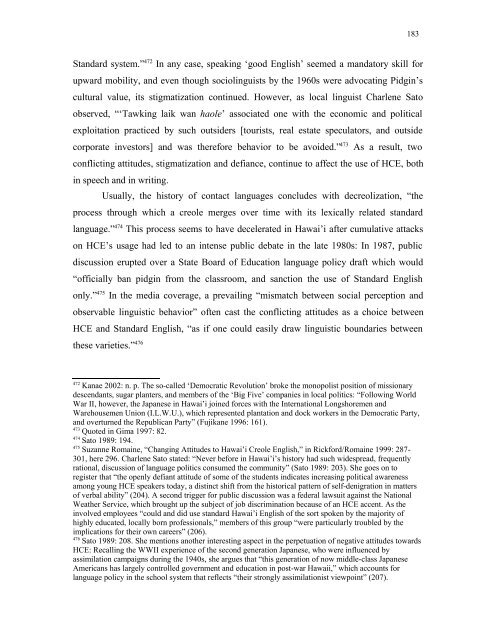A Paradise Lost - KOPS - Universität Konstanz
A Paradise Lost - KOPS - Universität Konstanz
A Paradise Lost - KOPS - Universität Konstanz
Create successful ePaper yourself
Turn your PDF publications into a flip-book with our unique Google optimized e-Paper software.
Standard system.” 472 In any case, speaking ‘good English’ seemed a mandatory skill for<br />
upward mobility, and even though sociolinguists by the 1960s were advocating Pidgin’s<br />
cultural value, its stigmatization continued. However, as local linguist Charlene Sato<br />
observed, “‘Tawking laik wan haole’ associated one with the economic and political<br />
exploitation practiced by such outsiders [tourists, real estate speculators, and outside<br />
corporate investors] and was therefore behavior to be avoided.” 473 As a result, two<br />
conflicting attitudes, stigmatization and defiance, continue to affect the use of HCE, both<br />
in speech and in writing.<br />
Usually, the history of contact languages concludes with decreolization, “the<br />
process through which a creole merges over time with its lexically related standard<br />
language.” 474 This process seems to have decelerated in Hawai’i after cumulative attacks<br />
on HCE’s usage had led to an intense public debate in the late 1980s: In 1987, public<br />
discussion erupted over a State Board of Education language policy draft which would<br />
“officially ban pidgin from the classroom, and sanction the use of Standard English<br />
only.” 475 In the media coverage, a prevailing “mismatch between social perception and<br />
observable linguistic behavior” often cast the conflicting attitudes as a choice between<br />
HCE and Standard English, “as if one could easily draw linguistic boundaries between<br />
these varieties.” 476<br />
472 Kanae 2002: n. p. The so-called ‘Democratic Revolution’ broke the monopolist position of missionary<br />
descendants, sugar planters, and members of the ‘Big Five’ companies in local politics: “Following World<br />
War II, however, the Japanese in Hawai’i joined forces with the International Longshoremen and<br />
Warehousemen Union (I.L.W.U.), which represented plantation and dock workers in the Democratic Party,<br />
and overturned the Republican Party” (Fujikane 1996: 161).<br />
473 Quoted in Gima 1997: 82.<br />
474 Sato 1989: 194.<br />
475 Suzanne Romaine, “Changing Attitudes to Hawai’i Creole English,” in Rickford/Romaine 1999: 287-<br />
301, here 296. Charlene Sato stated: “Never before in Hawai’i’s history had such widespread, frequently<br />
rational, discussion of language politics consumed the community” (Sato 1989: 203). She goes on to<br />
register that “the openly defiant attitude of some of the students indicates increasing political awareness<br />
among young HCE speakers today, a distinct shift from the historical pattern of self-denigration in matters<br />
of verbal ability” (204). A second trigger for public discussion was a federal lawsuit against the National<br />
Weather Service, which brought up the subject of job discrimination because of an HCE accent. As the<br />
involved employees “could and did use standard Hawai’i English of the sort spoken by the majority of<br />
highly educated, locally born professionals,” members of this group “were particularly troubled by the<br />
implications for their own careers” (206).<br />
476 Sato 1989: 208. She mentions another interesting aspect in the perpetuation of negative attitudes towards<br />
HCE: Recalling the WWII experience of the second generation Japanese, who were influenced by<br />
assimilation campaigns during the 1940s, she argues that “this generation of now middle-class Japanese<br />
Americans has largely controlled government and education in post-war Hawaii,” which accounts for<br />
language policy in the school system that reflects “their strongly assimilationist viewpoint” (207).<br />
183

















